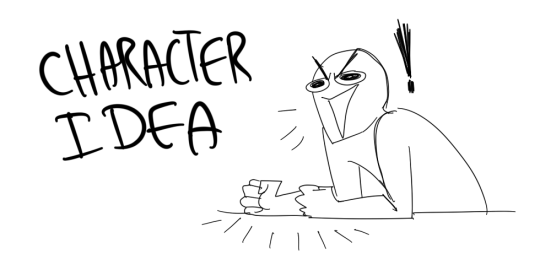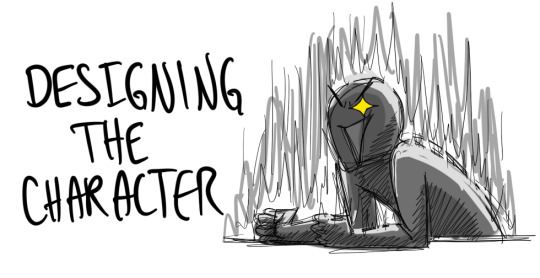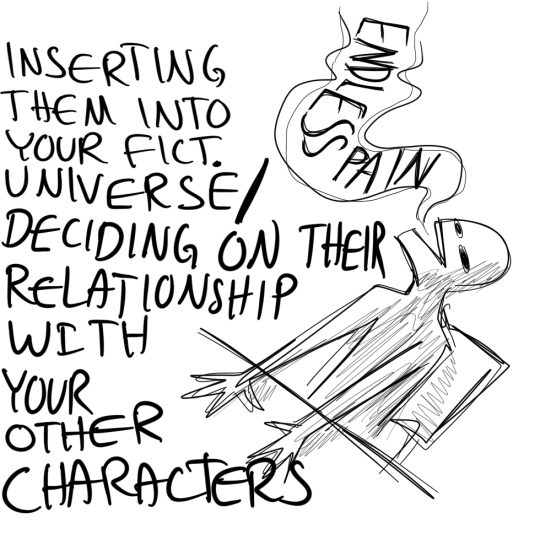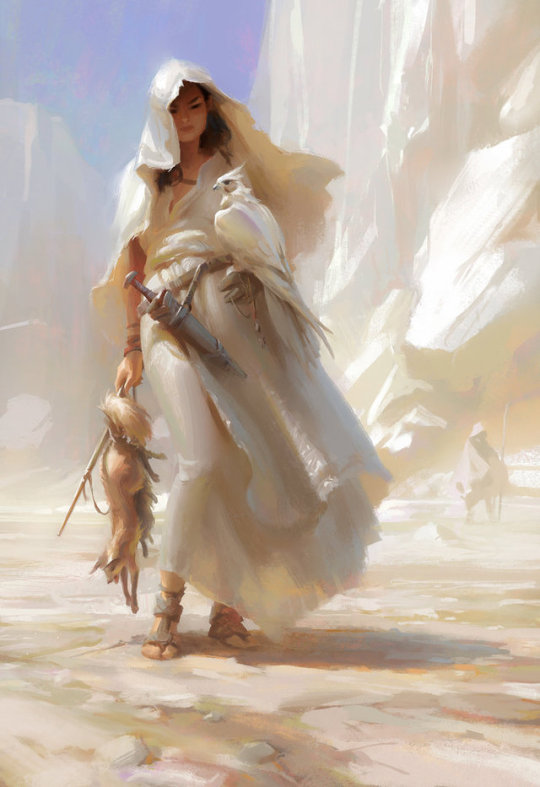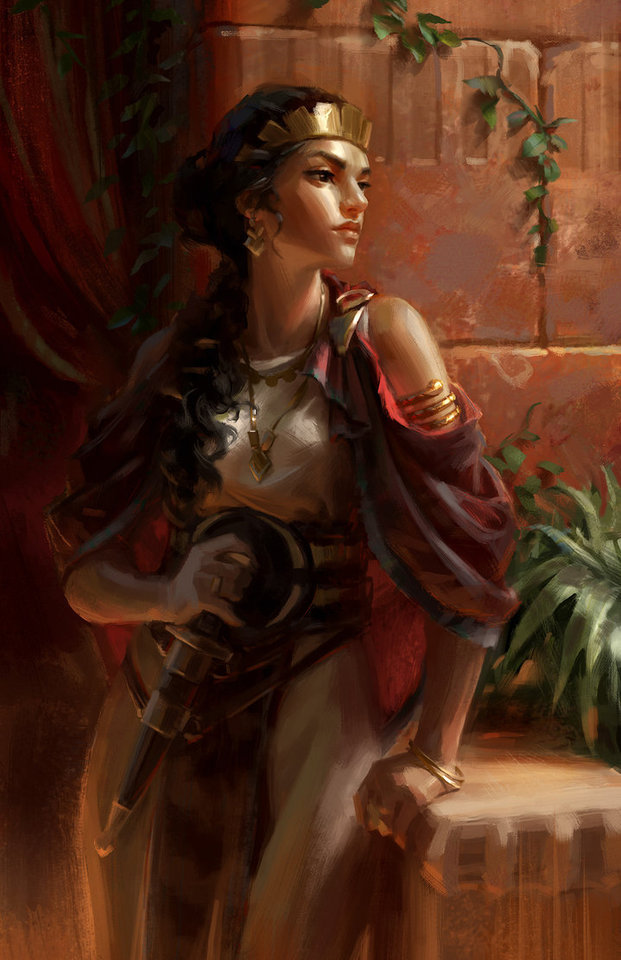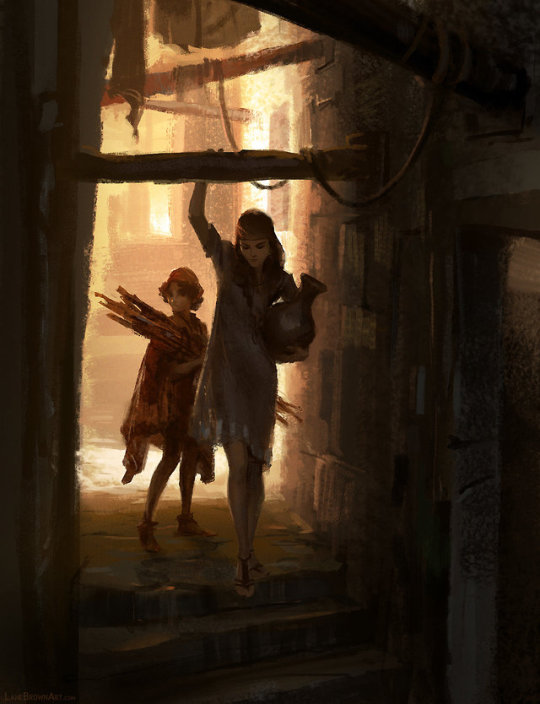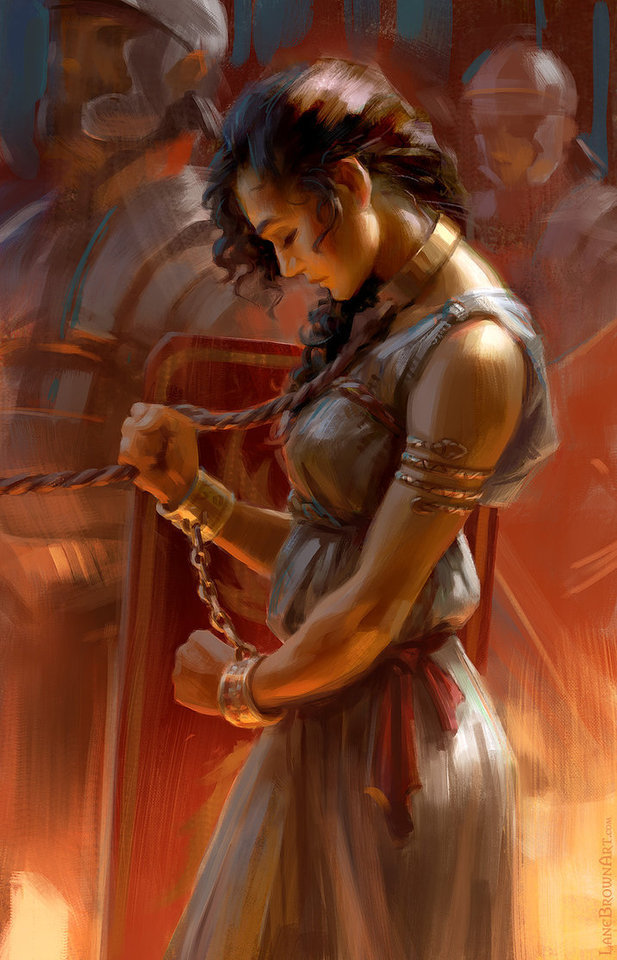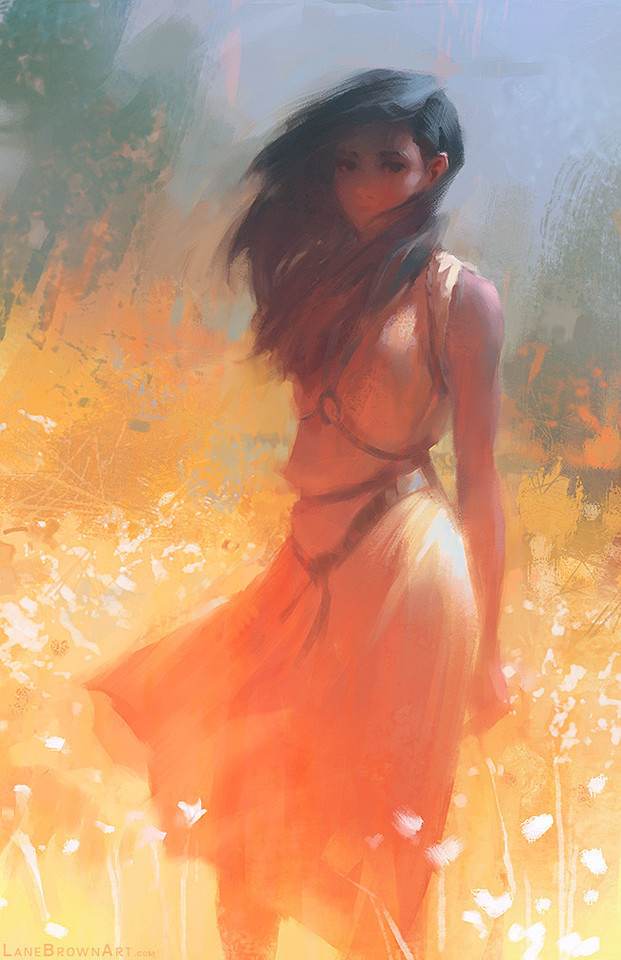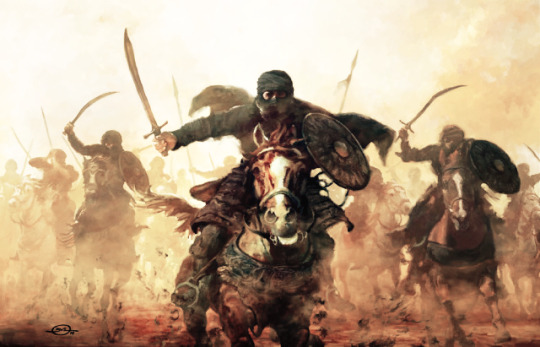Text

I'm always finding old WIP's in my files that I had forgotten about
2K notes
·
View notes
Text
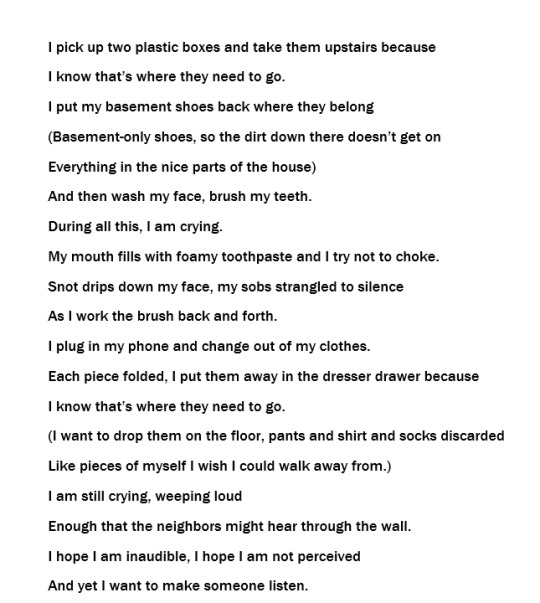
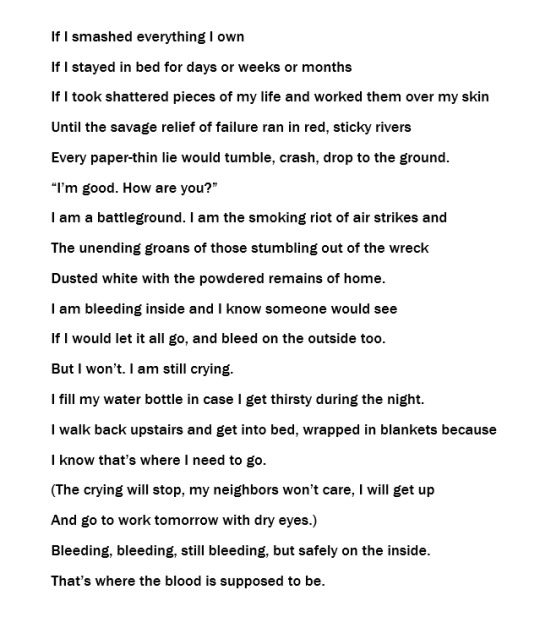
— D.B.G
#amwriting#poetry#my poetry#poets of tumblr#poets on tumblr#apparently this is what i do when im upset now#instead of call my mom and cry like i would have 10 years ago#poems#words words words
1 note
·
View note
Text
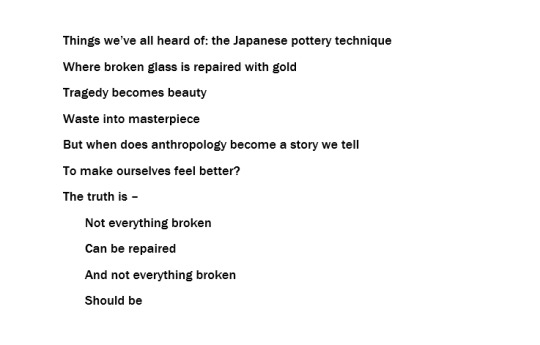
— D.B.G
2 notes
·
View notes
Text

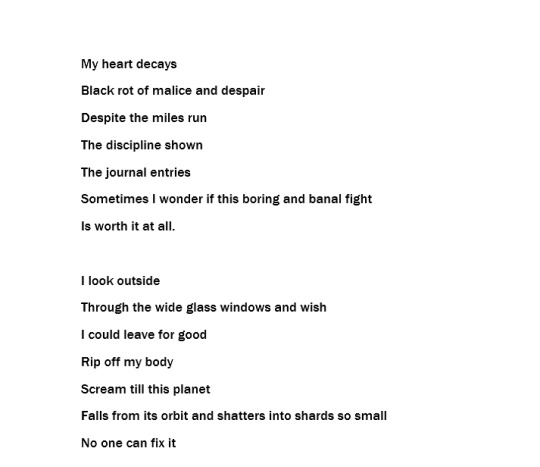
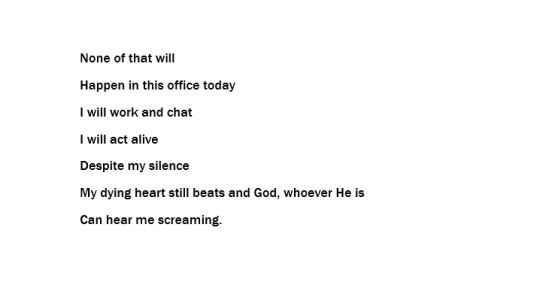
— D.B.G.
1 note
·
View note
Text

100K notes
·
View notes
Text
me every six months: ok its Time. i’m devoting myself totally to original fiction. by this time next year i will have a finished first draft
2 notes
·
View notes
Text
not sure what should happen next in your story?
Embarrass your protagonist. Make them seem weak and vulnerable in some way.
Shoot someone. That always takes the reader by surprise.
In relation, kidnap someone. Or, rather, make it seem to your protagonist like someone has been kidnapped.
Have one of your side characters disappear or become unavailable for some reason. This will frustrate your protagonist.
Have someone kiss the wrong girl, boy, or person, especially if you’ve been setting up a romance angle. It’s annoying.
If this story involves parents, have them argue. Push the threat of divorce, even if you know it won’t ever happen. It’ll make your readers nervous.
Have someone frame your protagonist for a crime they didn’t commit. This could range from a dispute to a minor crime to a full-blown felony.
If this is a fantasy story involving magic or witchcraft, create a terrible accident that’s a direct result of their spell-casting.
Injure your protagonist in some way, or push them into a treacherous scenario where they might not make it out alive.
Have two side characters who are both close to the protagonist get into a literal fist-fight. This creates tension for the reader, especially if these characters are well-developed, because they won’t know who to root for.
Make your protagonist get lost somewhere (at night in the middle of town, in the woods, in someone else’s house, etc.)
Involve a murder. It can be as in-depth and as important as you want it to be.
Introduce a new character that seems to prey on your protagonist’s flaws and bring them out to light.
If it’s in-character, have one of your characters get drunk or take drugs. Show the fallout of that decision through your protagonist.
Spread a rumor about your protagonist.
If your protagonist is in high-school, create drama in the school atmosphere. A death of a student, even if your protagonist didn’t know them personally, changes the vibe.
If your story involves children, have one of them do something dangerous (touch a hot stove, run out into the road, etc.) and show how the protagonist responds to this, even if the child isn’t related to them.
In a fantasy story, toss out the idea of a rebellion or war between clans or villages (or whatever units you are working with).
Add a scenario where your protagonist has to make a choice. We all have watched movies where we have screamed don’t go in there! at the top of our lungs at the main character. Make them go in there.
Have your protagonist find something, even if they don’t understand the importance of it yet. A key, a document, an old stuffed animal, etc.
Foreshadow later events in some way. (Need help? Ask me!)
Have your protagonist get involved in some sort of verbal altercation with someone else, even if they weren’t the one who started it.
Let your protagonist get sick. No, but really, this happens in real life all the time and it’s rarely ever talked about in literature, unless it’s at its extremes. It could range from a common cold to pneumonia. Maybe they end up in the hospital because of it. Maybe they are unable to do that one thing (whatever that may be) because of it.
Have someone unexpected knock on your protagonist’s door.
Introduce a character that takes immediate interest in your protagonist’s past, which might trigger a flashback.
Have your protagonist try to hide something from someone else and fail.
Formulate some sort of argument or dispute between your protagonist and their love interest to push them apart.
Have your protagonist lose something of great value in their house and show their struggle to find it. This will frustrate the reader just as much as the protagonist.
Create a situation where your protagonist needs to sneak out in the middle of the night for some reason.
Prevent your character from getting home or to an important destination in some way (a car accident, a bad storm, flat tire, running out of gas, etc.)
34K notes
·
View notes
Photo
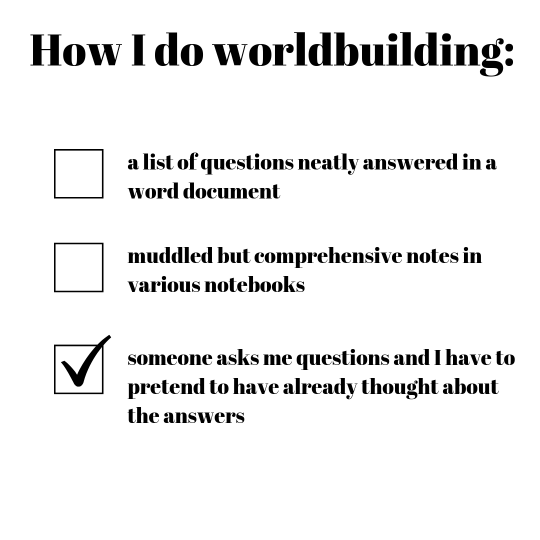
#option four: just writing absolute random nonsense into your chapter#and having to figure out how to reconcile it#with everything else later
132K notes
·
View notes
Text
Dealing with time in your writing
This is going to be quite an eclectic post, but I’ve received a few questions relating to time in creative writing. So, I thought I’d just make a post to address a few things.
1. Keeping track of narrated time
You as a writer need to keep track of the time that passes in your story and what happens when. Inconsistencies and incontinuities will pop up if you don’t have a good knowledge of your WIP’s time-line.
The easiest way to do this is to keep track via a visual time-line. If you outline, you can use that to make a rough time-line ahead of time. If you’re a pantser, then you can fill in the time-line as you go along.
Use this time-line to keep track of holidays, seasons, lunar cycles, healing time, travel time etc.
This is especially crucial for parallel storylines, where you might want to draw separate time-lines that you can hold up next to each other to ensure that everything matches up.
In certain instances it might also be necessary for the reader to keep track of the passing of time. You can either ensure this subtly within the writing (by sprinkling in little references to the season/date/time) or expressly by getting creative. Maybe each chapter starts with the date or the phase of the moon. Maybe your book is divided into seasons etc. If you do something like this, though, you have to be sure that the information plays a crucial role in your story.
2. Time-lapses between scenes
Time will inevitably pass in-between your scenes. But how do you communicate that time to your readers?
Firstly, you have to ask whether it’s relevant. If all your character did in the in-between time was brush her teeth and put on a nightgown, you don’t have to tell the reader that. You can use a simple sentence at the start of the next scene to familiarize your reader with the time of that scene e. g. “The next morning” or “After a night of tossing and turning”. This way the reader knows that time passed, but that nothing particularly important happened during that time.
If there are important points that you don’t want to dedicate an entire scene to, you can use the technique of telling. This should be used with circumspection, but can be a great way of relaying lots of information in a few sentences. E. g. “That morning after breakfast she had decided to head to the library to continue her research. She’d combed through shelves upon shelves of manuscripts only to end up back at square one.” Then, you can truly start the scene with the character sitting in the library, despondent. This way, the reader gets a quick catch-up as to where the story is at that moment, but you don’t have to spend too many words on it. You can also use this technique for deeply emotional events that the character may not want to spend a lot of time talking about e. g. “Lorna did not wake up that afternoon. She would never wake up again. And all Nancy had done all evening was weep.”
Comment if you guys want me to do a post about showing vs telling.
3. Flashbacks
I love flashbacks, but they have to be done well and they have to be necessary.
Flashbacks are a great way of telling a long, complex story in less words. It’s also a very valuable tool for revealing plot twists and character backstory.
Ensure that your flashbacks are adequately separated from the rest of your scenes. I don’t mean that they have to exist in a separate chapter (although this is an option), but at least use a different formatting style so that it’s clear to the reader when they’re dealing with a flashback.
Make it as easy as possible for the reader. Achronology can be disorienting and confusing. So, if you’re working with different timelines, make sure the reader knows which timeline they’re reading at the moment. You can do this by clearly indicating the time of the flashback at the beginning or woven into the writing of the scene.
Remember that these flashbacks should be relevant to your story/character arc. Don’t just throw in flashbacks for the hell of it. These scenes should reveal something important about the character or the plot.
4. How do the characters tell the time?
This is a bit of a weird one, but it should be taken into account nonetheless.
If you write contemporary fiction or historical fiction set in recent(ish) history, you don’t have to worry about this. However, those of us writing in made-up worlds or ancient/futuristic times have to think about this shit.
Have wathes/clocks been invented? Do your characters have micro chips in their brains that have them knowing the time automatically? Do they use a sundial? Are there calendars (and do they differ from the contemporary one) etc.
If your characters live in a Stone Age world, but they know when it’s 13:45, you’re gonna have to explain how the hell they know that.
Keep historical accuracy in mind if you’re not writing your own world e. g. if you’re writing a book set in Ancient Rome, you should do some research to figure out how they told time.
5. Consistency in time periods
This cannot be stressed enough. Keep healing time, travel time, seasonal changes etc consistent and realistic.
If you’re writing something set in the real world, you should research how long it takes to heal from certain wounds or how long it takes to travel between places etc.
Even if you made up your own world, own creatures and own laws of physics, you should keep the times consistent throughout the work.
That’s all I have for you on time. I hope that this very random post can be helpful.
Reblog if you found these tips useful. Comment with your own questions/ideas around time in writing. Follow me for similar content.
8K notes
·
View notes
Photo



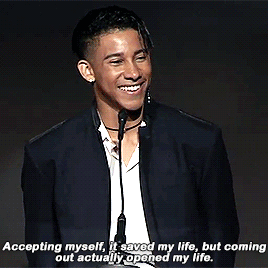
Keiynan Lonsdale speaks at the GLSEN Respect Awards
23K notes
·
View notes
Photo




There’s one disturbing notion throughout India that light skin is more attractive than dark.
1K notes
·
View notes
Photo
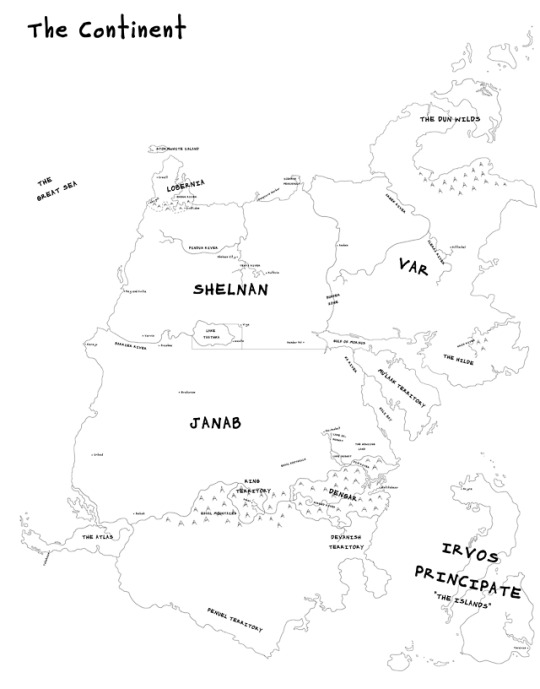
the new and improved map of the Dervish world: now with more detail and hopefully less eurocentrism (click for high res)
0 notes



